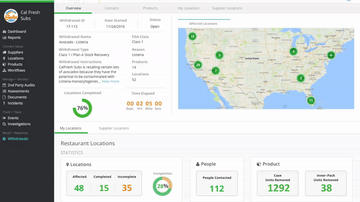While preventative action can be taken to mitigate the effects of a food product recall, it’s something that your company needs to be prepared for at any time. Food product recalls can change a company's whole dynamic from financial devastation to reputational damage – after all, the average food recall totals $2-$10 million in direct costs.
In 2022, food product recalls were a hot topic in the food industry. Notable companies, like JIF, Costco, and Target, have had quality and supply chain problems leading to reputable damages in products that consumers know and trust. From January 1, 2021, to June 1, 2022, there have been 492 recalls, with 145 being terminated. In 2020, there were 535 total recalls, signifying a slight drop-off in the number of recalls, partially due to pandemic impacts.
Below we look at a few notable trends from 2022 food product recalls:
Most Common Foods Recalled
In 2022, the most common type of food that was recalled was seafood. There have been over 80 fish recalls since 2021, affecting 18 states. Banner Fish, Inc. distributed smoked fish with potential listeria contamination, and brands that sold Banner Fish under a nother name were also recalled.
Additionally, produce – specifically dried fruits and mushrooms – was a commonly recalled food product in 2022. Enoki mushrooms, a product from Asia, were found to have potential listeria contamination in four different brands. Listeria can easily grow on mushrooms due to cross-contaminated areas and cool and wet conditions of the mushroom’s manufacturing process.
Furthermore, more than ten brands had recalls on dried fruits, including Target and Costco, from 2021 until June 2022. Unlike the mushrooms, these products didn’t have a specific recall commonality but still managed to be one of the most recalled items.
JIF’s peanut butter salmonella contamination also caused quite a few recalls and received significant press coverage. JIF’s recall caused shock among consumers, as people had come to know JIF as a staple item in their pantry. Companies that used JIF’s peanut butter, like chocolate and apples, also frequented the recall list. Further, JIF’s recall led other brands to pull their peanut butter products from the shelves because of the risk of salmonella contamination.
In general, foods containing eggs, milk, or nuts, along with meat and produce, tend to be recalled more commonly because of the higher risk and precaution surrounding manufacturing. Minimal-risk goods, like chips, were not big contributors in recent recalls, mainly because minimal-risk foods don’t have the looming potential of bacterial contamination compared to an item like romaine lettuce, which has a more difficult growing and storing process. Also, foods that don’t contain allergens are far less likely to be recalled because they don’t have the responsibility to declare them, per regulatory guidelines.
Common Recall Contributors
The lead contributing factors to food product recalls in 2022 were undeclared ingredients like milk, eggs, and nuts. Since milk, eggs, and nuts are popular allergies/dietary restrictions, items that fail to disclose them are recalled. Other common recalls were potential salmonella, E. coli, and listeria contaminations. Meat, like seafood and chicken, and produce, like bagged salad and fruit, as well as peanut butter products, were the leading culprits behind the 2022 bacterial recalls.
Along with problems with the ingredients and quality of food, there were many recalls due to manufacturing problems that contaminated food with bits of metal or other extraneous material. For example, 162,000 pounds of Skippy’s peanut butter was recalled for containing steel fragments from the manufacturing machine.
Food Recall Regulations
FSMA (Food Safety Modernization Act) is the primary food safety regulation that was enacted in 2011; it changed food safety laws to prioritize prevention instead of response. It regulates food traceability and establishes the framework for food safety and recordkeeping. FSMA has been evolving with the food industry ever since, with new tweaks in regulation as the food industry grows. FSMA performs actions like preventative control, inspection, imported food safety, transport protocol, and recall authority.
The newest pending regulation, FSMA 204, lays the foundation for true end-to-end food traceability and focuses on tracking food products at every step in the supply chain – it also includes guidance for the designated Food Traceability List, which details specific food products that must be regulated, both on their own and for products that contain them.
Regulation and recall guidelines, like FSMA, are necessary for food safety and represent initiatives toward preventative action for food product recalls. Mistakes will undoubtedly be made in food production and manufacturing, and people could get sick without regulation. Traceability and transparency yield trustworthiness to companies and give consumers a feeling of safety. Moreover, compliance with FSMA and the FDA will hold companies accountable for practicing upstanding production protocol and providing safe food.
Moving Toward a Safer Food System
Recalls are an inevitable misfortune; however, regulations and safety policies should help contain outbreaks and catch mistakes from the start. Regulation concerning traceability as well as transparency will be important as the FDA further examines safe food production.
It will be essential for companies in the food industry to keep up to date with FSMA policy and safe food practices to maintain a good reputation and consumer base for your brand. Food safety is a priority for consumers, so implementing the right solutions and following the FDA’s guidelines should be prioritized to work toward a safer, more traceable food system.
Other posts you might be interested in
View All Posts
Product Formulation
10 min read
| February 24, 2023
The Price of Safety: Understanding the True Cost of a Food Recall
Read More
Food Industry
6 min read
| May 18, 2017
FoodLogiQ Disrupts the Food Industry with Market’s First Real-Time Recall Management Solution
Read More
Supplier Compliance
9 min read
| August 24, 2023

